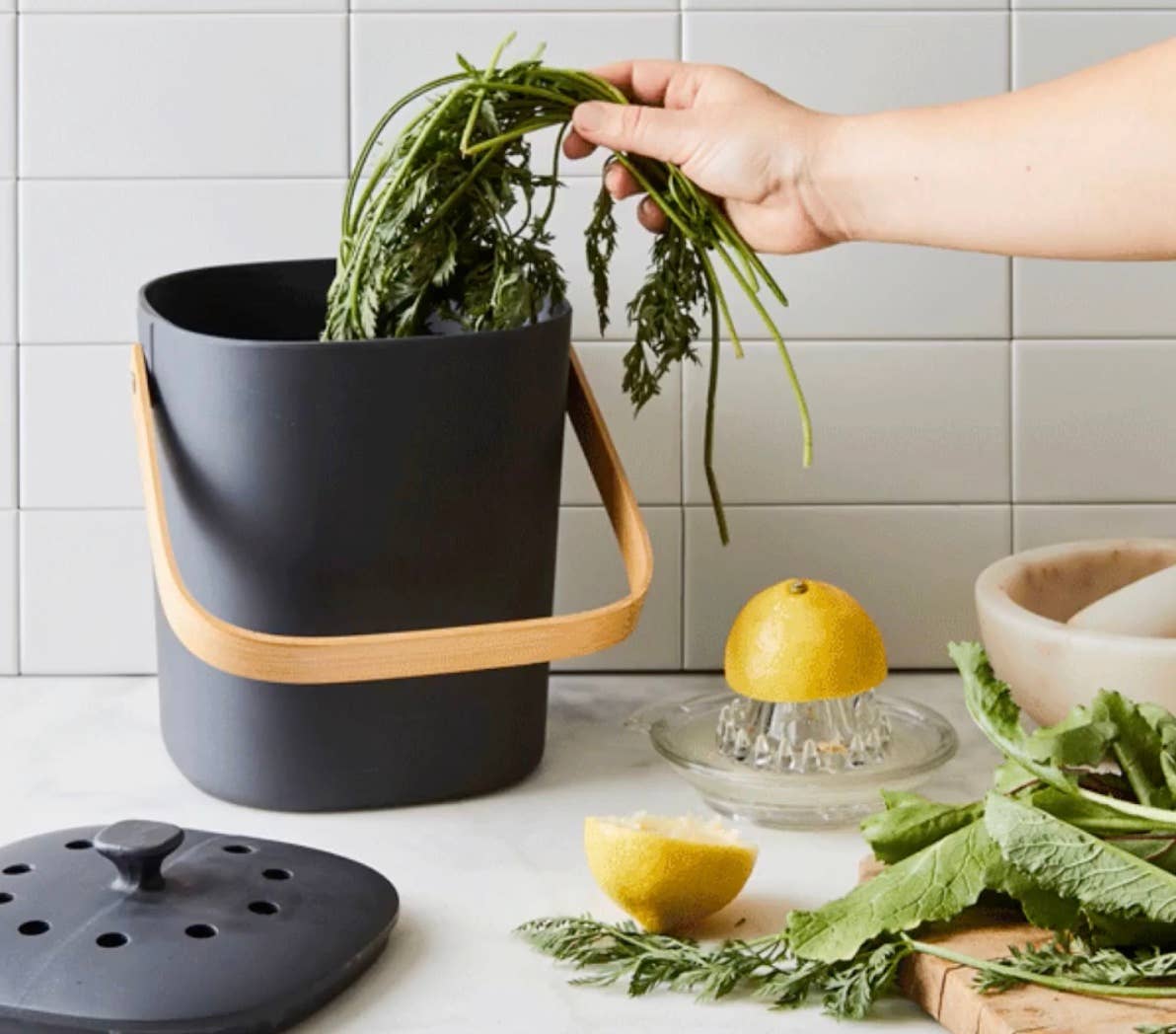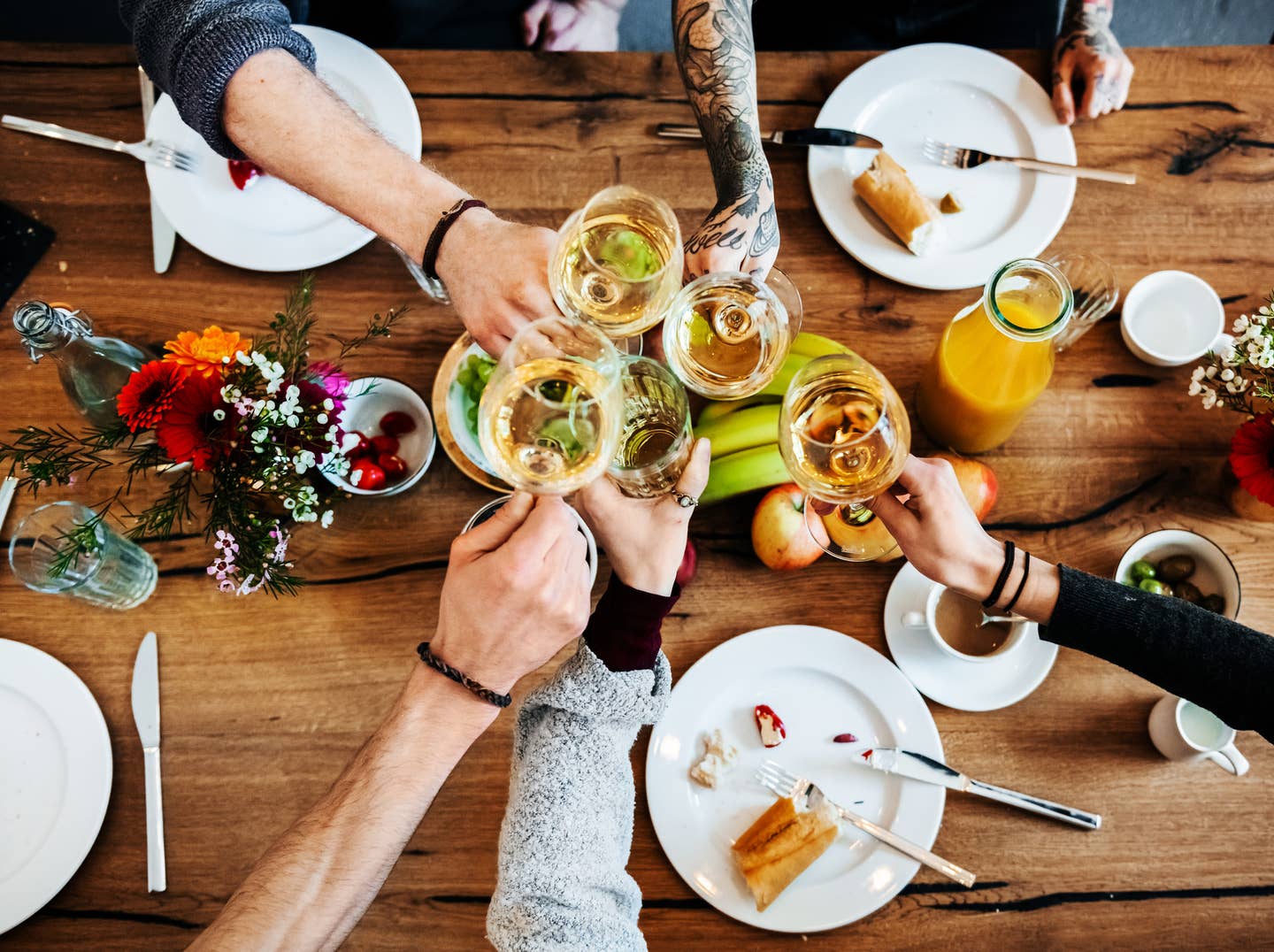
How to Start Composting, Reduce Waste and Add Nutrients Back to the Soil
If you're thinking about starting composting, this is the perfect time to get started, just in advance of the planting season and when most cities are about to restart their pick-up services. Whether you're a city dweller with a small kitchen or live in a house where you have room for a backyard garden, composting is a great way to reduce your carbon footprint by turning your table scraps into natural soil-enriching fertilizer with very little effort.
Composting is easy, does not require any special equipment (or worms!), and can be done on a kitchen counter, in a medium-size bucket or pot, or any covered container. All you have to do is start by adding scraps. Not just any scraps, but those of vegetables, leaves, peels, seeds, and anything that comes from a plant that grows in the ground: Think about all the organic scraps you throw away in a day: Avocado pit and peel, carrot tips, orange peels, broccoli stalks and leaves, artichoke leaves, green pepper seeds, cantaloup guts, and even coffee grounds, which all can now go into your compost.
What doesn't go into your compost bin? Animal products. That includes meat, anything that originally came from an animal or byproduct, including butter, bones, meat scraps, mayo, chicken skin, and eggs. (Eggshells can go in, however, just so long as they are fully free of the whites and yolk.) Add coffee grounds and tea leaves, plant stalks or branches and leaves. Think of it this way: Animals rot, while plants break down and turn back into the soil, bringing with this process all of the rich nutrients like nitrogen and minerals used to grow them in the first place. Once you get started, it's fun and you end up reducing your household waste and need to take out the garbage to about half as often.
Why should you compost? Not only does composting reduce your overall waste and minimize your household garbage output, but it all creates a mineral-rich black soil topper that helps your plants to grow, acts as a natural non-chemical fertilizer, fights off parasites, and ultimately feeds both the soil and the plant to add back nutrients and nitrogen that was pulled from the soil in the growing process. It's like giving back and paying it forward all at once, but the beneficiary of this generosity are plants and the planet.
Rebecca Louie, the founder of the Compostess website and author of Compost City, told the Strategist in March: “Composting is the human version of re-creating what mother nature does out in the wild: Taking a controlled space and mixing together various organic materials in magical cocktails or recipes appropriate to the system.”
Once you start composting you take your small container full of scraps and put it outside it can sit for weeks or even months, over which time it all melds together and decomposes into a dark rich soil additive that when you ultimately spread it on the soil where your plants are growing, working as plant food or enhancer, and supplying them with a nitrogen-rich fertilizer that feeds them and helps them grow. Here's everything you need to get started on composting–read this before you throw your next apple core or peel into the garbage.
Composting for beginners: Here's how to start your compost
You probably already recycle, which is great for the planet. The next logical step is to start to compost, which will not only drastically reduce your garbage volume and minimize waste but also create rich fertilizer to add to your plants, which will be great for them and help replace chemical fertilizers that you might have been adding in the past. Composting is easy and with a few basic rules, anyone can do it. Just remember: If it grows it goes (into the compost) and if it walks or has a face, put it in the waste.
First: Why should you start to compost?
Anyone who wants to shrink their carbon footprint, reduce their overall waste production, lower their impact on the environment, and at the same time help local farmers or community gardeners grow more organically by using compost as chemical-free fertilizer, should compost. Wasted food accounts for 30 percent of our total greenhouse gases (including the resources to grow it) so the methane from landfills can be reduced by composting our organic waste and feeding that rich soil back to local organic crops.
When you get into gardening, the next step is to start composting. Or if you're a city dweller and want to reduce your waste, composting is a great way to do it. For a list of which cities offer composting pick up and drop off, check out Rethink Green's list of 15 cities that help you compost. Composting is essentially the act of throwing together all the organic waste in your life. That can include garden castoffs or yard leaves, plant-based kitchen scraps (other than all meat, dairy, poultry, or fish products), and beans, seeds, tea leaves, coffee grounds that you would otherwise discard into your garbage. It starts to break down and ultimately turns into a rich, dark, dense soil that can be used as fertilizer, plant nutrients, and plant food.
What is Composting and How Does It Work?
Composting is the act of recycling organic material by allowing it to return to its natural state: a dark, thick rich soil that is full of nutrients for growing plants and vegetables. The act of collecting your scraps may seem strange unless you grew up on a farm–and compost is "black gold" to farmers who use it to fertilize their crops and plants–but even as a city dweller used to throwing out everything in the same bin, once you start composting, you realize: It's easy, it doesn't smell, and it reduces your family's waste by a large fraction, even half. Your regular garbage won't smell at all if you are a plant-based eater, since the majority of the other garbage you produce will also be clean and recyclable. Composting is the best way to reduce your carbon footprint and make you learn about local community gardens that pick up your compost if you don't have a use for it in your own yard or home.
How Do You Start Your Compost
First, get a bin. Or until it arrives, just use an old pot and lid. Put it on the side of your counter near where you chop your vegetables or make your smoothies. As you chop, throw the tips and skins and peels and seeds into the bin and leave it. After a few days, it might look a little ripe or moldy but it magically won't smell (unless you inadvertently add some animal product like milk or butter, but try to not let that happen. As you add items you'll notice that the compost starts to shrink.
Once your pile of scraps really decomposes it will be less than half its original size, as the items decompose and shrink down to their essential nutrients. Your bin should have a filter on top to capture any gasses that come off the vegetables. Once your bin is full, you want to drop it off at a local center or community garden or get it picked up. Finding a drop-off spot is easy in your neighborhood. Some services will even pick up for a small fee, and at least one, in New York City will also deliver organic vegetables from the local farm they are donating the compost to, as an incentive to keep that black gold coming.
What Do You Do with Your Compost
As COVID-19 restrictions begin to lift, many city composting programs that had been stalled are now being put back into motion, and cities, including New York, are restarting their pick-up or drop-off composting programs. All you have to do is call 311 and request that your building or area get put on the pickup schedule, and if you live in San Fransisco, Seattle, or other cities that have mandatory composting, you're in luck. Check with your town's recycling authorities to find out how to get your scraps picked up or for drop-off centers. Some community gardens will even trade produce for compost material or offer a discounted price for fresh vegetables.
Start to do a little research and you'll find spots for drop-off or even services that pick up. In New York, for instance, GrowNY started local drop-off sites to help encourage people to compost and to support the city's growing "brown bin" recycling program. But when composting stopped across the city last March due to COVID-19 restrictions, one young architect named Vivian Lin started a compost pickup service and for a small fee will also drop off organic produce when she picks it up. For details, her company is called GroundCycle, and it's a growing business. San Francisco has had a mandatory compost recycling program in place, having started its first composting program back in the 1980s, while Seattle has a dedicated program, and if your town or city doesn't yet, contact your local councilman or woman and request that a program get started.
If you live in New York, the pickup spots are all over the city, and the program is about to start up again, so find out about a spot near you or call 311 and request a pickup by August 1, 2021, since the city will begin its "brown bin" recycling again, starting this fall.
Doesn't It Start to Smell?
Most compost bins for the countertop contain a small charcoal filter at the top which eliminates any smell. If your compost begins to smell, just empty it out of the kitchen counter small bucket and into the backyard larger container. If that gets gamey, you may want to add more untreated sawdust or coffee grounds, both of which absorb extra moisture and leach the smell out of the decomposing items that are often the wetter ones like fruit scraps. Pitchfork it, or poke it, stir it or turn it over, so the pile can release some of the gases into the air (wearing a mask or bandana to save yourself from inhaling the unpleasant odors.)
Do You Need Worms or Bugs to Start Composting?
No. You definitely do not need to add worms or other bugs or creepy crawlers to your compost. Once in the garden or outside, they will likely find their way into your outdoor container in any case, but either way, the molecules break down just fine on their own. The two things you will need are a countertop container with a lid which can also be a specific bucket with a charcoal filter to absorb the smell, and an outdoor spot to dump your scraps onto. The drum that turns is a great addition to your backyard (just hide it out of sight) since you can turn the composting once a week or so and keep it mulching and moving through its natural paces. When you add items, alternate from side to side to keep the composting decomposing evenly so you will always have one side that is more ready than the other to be spread on your plants.
Why is Composting Popular?
Composting is growing around the country as more people realize it's an easy way to help the planet, lower your carbon footprint, recycle in a meaningful way (now that we know most plastic does not get recycled but ends up in landfills, or worse, our oceans), and pay it to forward to the future growth of organic gardening and help grow plants without chemicals.
For information about recycling pick up and drop off near you, go to CompostNow and find out if your local recycling services include it, and if they don't ask your representatives to start it. Or, get in touch with your local community farm or garden and ask if they will let you drop off "black gold," to help them grow their organic crops that much faster and healthier.
More From The Beet






